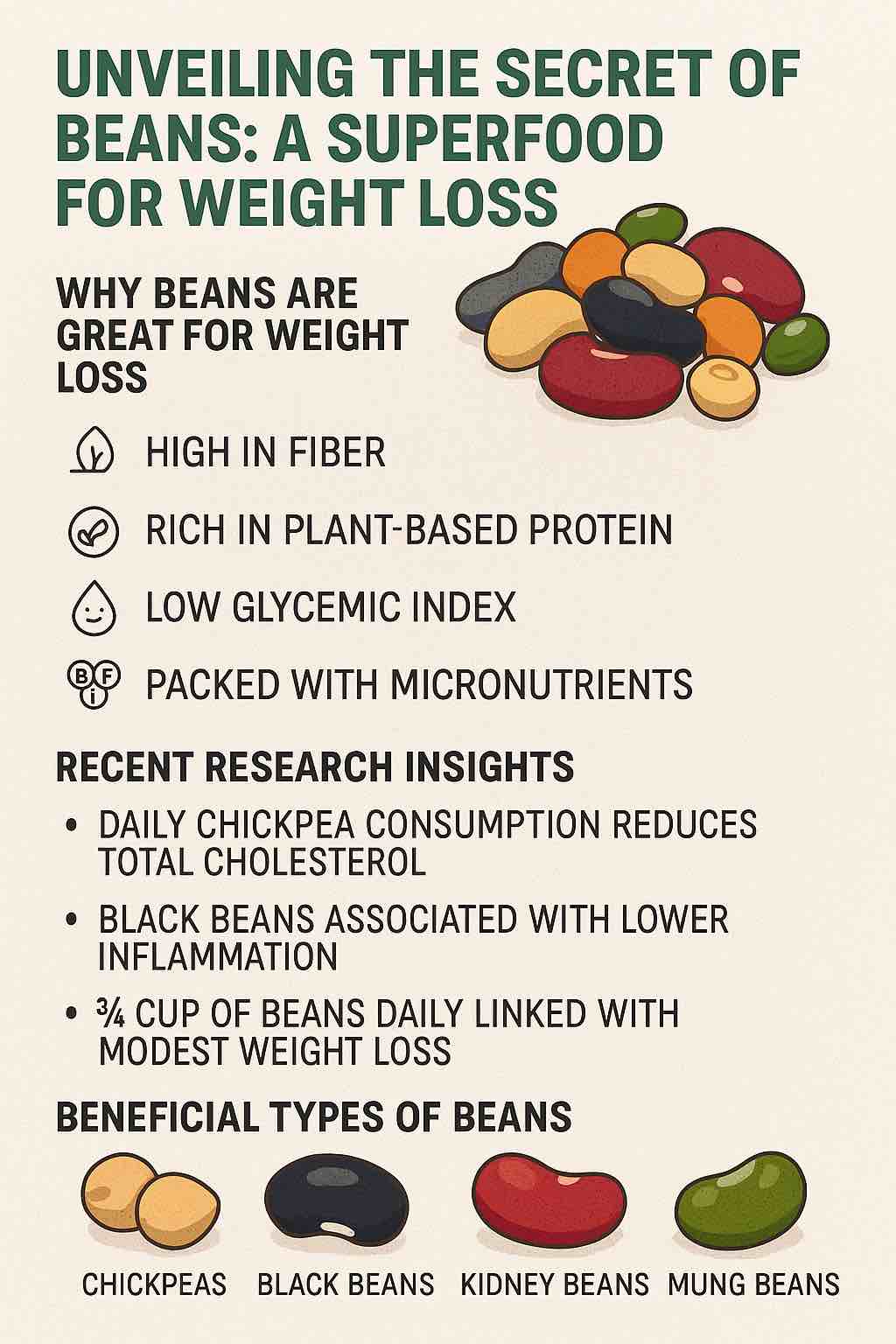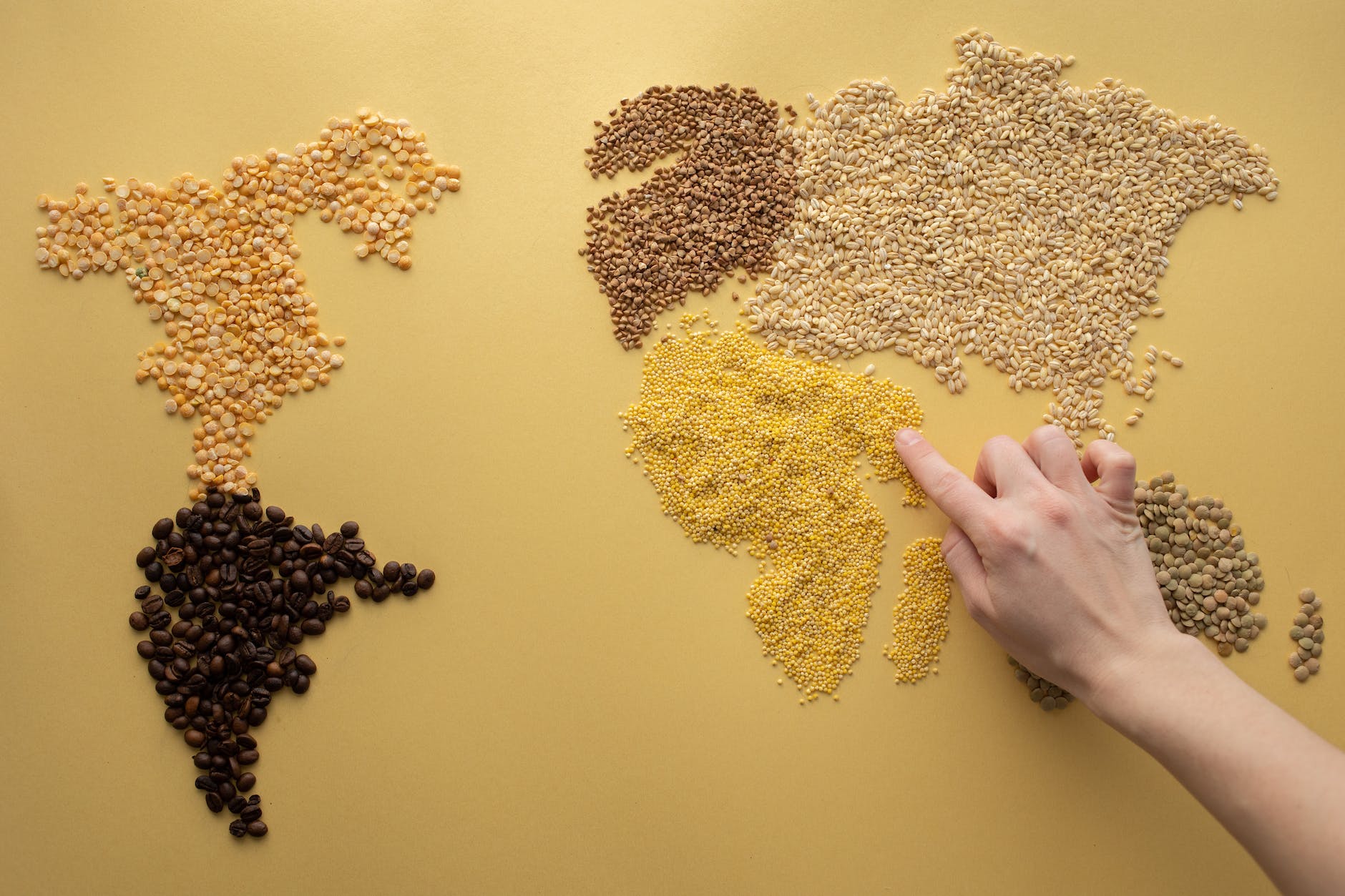
When it comes to superfoods that support weight loss, beans might not be the first to come to mind. Yet, these humble legumes have quietly earned a reputation as nutritional powerhouses capable of transforming your health and slimming your waistline. From chickpeas to black beans, kidney beans to mung beans, incorporating these versatile foods into your daily diet can unlock a host of benefits — including sustainable weight loss.
In this post, we’ll explore why beans are a secret weapon in weight management, dive into the science behind their fat-burning potential, and share practical tips to include them deliciously in your meals.
Why Beans Deserve a Spot on Your Plate
Beans have been a staple in diets worldwide for centuries — and for good reason. Beyond their affordability and accessibility, they pack a powerful nutritional punch:
1. High Fiber Content — Your Ally for Fullness and Fat Loss
Beans are loaded with dietary fiber, especially soluble fiber, which slows digestion and helps keep you feeling full for longer. This satiety reduces hunger pangs and curbs overeating, a crucial factor in weight management.
Fiber also supports healthy digestion by feeding beneficial gut bacteria, which can indirectly influence metabolism and weight regulation. Research suggests that a fiber-rich diet correlates with reduced body weight and fat mass.
2. Plant-Based Protein — Building Blocks for Lean Muscle
Maintaining muscle mass is essential when losing weight, as muscles burn more calories at rest than fat. Beans provide a significant amount of plant-based protein, which supports muscle repair and growth while being lower in calories and saturated fat than animal proteins.
By combining beans with grains like rice or quinoa, you can obtain a complete protein profile with all essential amino acids.
3. Low Glycemic Index — Stable Blood Sugar for Appetite Control
The low glycemic index (GI) of beans means they release glucose slowly into the bloodstream, preventing the spikes and crashes that lead to cravings and overeating. Stable blood sugar levels are linked to better appetite control and reduced fat storage.
4. Micronutrient Powerhouse — Supporting Overall Health
Beans are rich in essential vitamins and minerals like magnesium, potassium, iron, and folate, all of which play roles in energy metabolism and fat burning. Magnesium, for instance, is critical for hundreds of enzymatic reactions, including those that regulate blood sugar and insulin sensitivity.
Scientific Insights: What Research Says About Beans and Weight Loss
Let’s examine some of the latest scientific findings that shed light on how beans support weight loss and metabolic health:
Chickpeas — Beyond Basic Nutrition
A study presented at the American Society for Nutrition conference revealed that adults with prediabetes who consumed chickpeas daily saw significant reductions in total cholesterol. This indicates improved cardiovascular health, which often accompanies weight loss efforts.
Moreover, chickpeas’ high fiber and protein content contributes to increased feelings of fullness, which helps reduce overall calorie intake.
Black Beans — Fighting Inflammation and Supporting Metabolism
Chronic inflammation is a known contributor to obesity and metabolic disorders. Research shows that black beans help reduce levels of inflammatory markers such as interleukin-6, potentially improving insulin sensitivity and fat metabolism.
The antioxidants and phytochemicals in black beans further promote metabolic health and may aid in reducing body fat.
Kidney Beans — Resistant Starch for Fat Burning
Kidney beans contain a type of carbohydrate called resistant starch, which resists digestion and reaches the colon intact. Here, it acts as a prebiotic, feeding good gut bacteria and producing beneficial short-chain fatty acids.
Resistant starch has been linked to increased fat oxidation (fat burning) and improved insulin sensitivity, both important for weight management.
Mung Beans — Easy on the Digestive System and Low-Calorie
Mung beans are low in calories but high in protein and fiber, making them excellent for weight-conscious individuals. Their easy digestibility makes them suitable for sensitive stomachs and supports consistent nutrient absorption.
How to Incorporate Beans into Your Weight Loss Plan
Eating beans regularly doesn’t have to be boring or complicated. Here are practical tips to include beans in your diet for maximum benefit:
Start Slowly and Build Up
Beans are rich in fiber, so if you’re not used to them, start with small portions and gradually increase. This helps your digestive system adjust and reduces the risk of bloating or gas.
Experiment with Varieties and Recipes
Don’t limit yourself to one type of bean. Rotate among chickpeas, black beans, kidney beans, and mung beans to enjoy diverse flavors and nutrients.
- Add beans to salads for extra texture and protein.
- Use mashed beans as a spread or dip.
- Incorporate beans into soups, stews, chili, and casseroles.
- Swap beans for meat in tacos, burgers, or pasta dishes.
Combine Beans with Whole Grains
Pair beans with whole grains like brown rice, quinoa, or barley to create complete proteins and balanced meals that keep you full and energized.
Opt for Fresh or Dried Beans
While canned beans are convenient, they often contain added sodium. Choose fresh or dried beans whenever possible and soak or cook them yourself to control salt levels.
Spice It Up
Beans absorb flavors well. Use herbs, spices, garlic, lemon, and vinegar to enhance taste without extra calories.
Debunking Common Myths About Beans and Weight Loss
Myth 1: Beans Cause Weight Gain Because They’re Carbs
Truth: The complex carbohydrates in beans digest slowly, promote satiety, and don’t spike blood sugar like refined carbs do. When eaten as part of a balanced diet, beans support weight loss.
Myth 2: Beans Are Just Filler Food
Truth: Beans are nutrient-dense and provide essential vitamins, minerals, fiber, and protein — making them much more than “filler.”
Myth 3: Beans Make You Bloated and Uncomfortable
Truth: While beans can cause gas initially, proper soaking, cooking, and gradual introduction reduce discomfort. Over time, your gut adapts.
The Sustainable Choice: Why Beans Are Good for You and the Planet
Beyond personal health, beans are an environmentally friendly protein source. They require less water and emit fewer greenhouse gases compared to animal proteins. Including beans in your diet is a win-win for your weight and the planet.
Final Thoughts: Unlock the Weight Loss Power of Beans Today
Beans truly deserve their superfood status. With their potent combination of fiber, protein, and micronutrients, they support appetite control, boost metabolism, and promote overall health. Incorporating a variety of beans into your meals can help you achieve sustainable weight loss while enjoying delicious, satisfying food.
Ready to start your bean journey? Try swapping one meat-based meal per week with a bean-based alternative and experience the difference.
FAQs: Beans and Weight Loss
1. Are beans really effective for weight loss?
Yes. Beans are rich in fiber and protein, which promote fullness and reduce overall calorie intake. Their low glycemic index also helps stabilize blood sugar, preventing cravings and supporting weight management.
2. Which type of beans is best for weight loss?
All beans offer benefits, but chickpeas, black beans, kidney beans, and mung beans are especially effective due to their high fiber, protein, and resistant starch content.
3. Can eating beans cause bloating or gas?
Beans contain fermentable fibers that can cause gas initially. To minimize this, start with small portions, soak dried beans well, rinse canned beans, and gradually increase intake to allow your digestive system to adjust.
4. How much beans should I eat daily to aid weight loss?
Studies suggest that about 3/4 cup (around 130 grams) of cooked beans daily can contribute to modest weight loss and improve diet quality.
5. Are canned beans as healthy as dried beans?
Canned beans are convenient and nutritious but often contain added sodium. Rinse them well before use or choose low-sodium versions. Dried beans cooked at home allow better control over salt content.
6. Can beans replace meat in a weight loss diet?
Absolutely. Beans are a great plant-based protein source that can replace or supplement meat, lowering calorie intake and saturated fat while still providing essential nutrients.
7. Will eating beans make me gain weight because of their carbohydrate content?
No. The carbohydrates in beans are complex and digest slowly, promoting fullness and stable blood sugar rather than fat storage, especially when eaten as part of a balanced diet.
8. How can I include beans in my meals without getting bored?
Try diverse recipes like bean salads, soups, stews, dips, or even bean-based burgers and tacos. Experimenting with different herbs and spices also keeps meals flavorful.
9. Are beans suitable for people with diabetes trying to lose weight?
Yes. Beans’ low glycemic index helps regulate blood sugar levels, making them an excellent food choice for people with diabetes aiming to lose weight.
10. How do beans support gut health?
Beans contain prebiotic fibers that feed beneficial gut bacteria, promoting a healthy microbiome, improving digestion, and supporting metabolism, which are all important for weight management.










